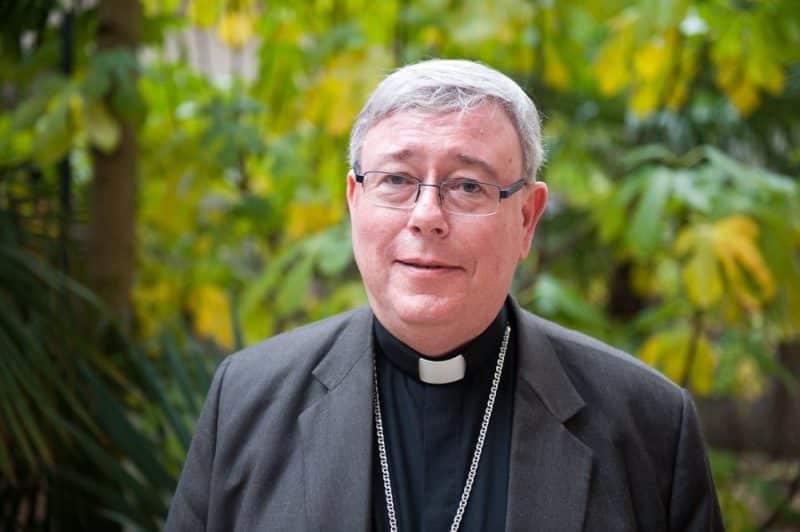OXFORD, England (CNS) – The Brussels-based commission representing the Catholic bishops of the European Union is backing tougher steps to combat hate crimes, but warned that current EU proposals could violate religious freedom and have a “chilling and self-censoring effect”.
“Hate crimes are more and more common, and are cause for increasing concern – a grave phenomenon to be condemned without reservations,” the Commission of European Union Bishops’ Conferences said in a June 7 statement.
However, while supporting such measures, the bishops’ commission, known as COMECE, expressed concern that establishing provisions uniformly across the EU would potentially criminalise “the mere expression of an idea, at actions carried out by the church in exercising its magisterium and teaching activities”.
Acknowledging that the Catholic Church was committed to “effective policies” against hate crimes, and favoured “sound reporting mechanisms” and “effective and regular data collection”, COMECE said such measures were best addressed by individual EU nations.
The commission noted that the EU’s Lisbon Treaty of 2007 recognised “different legal systems and traditions” among the bloc’s 27 member-states, and said categorising the offences as “EU crimes” risked restricting “core fundamental rights”, including freedom of speech and faith.
Headed by Cardinal Jean-Claude Hollerich of Luxembourg, COMECE’s statement was released of the planned debate on EU-wide legislation.
“The risk of a chilling effect on democratic debates and open discussions in society is always present, precisely due to the unsure borders for conduct and expression. While aiming at promoting tolerance and prudence, the relevant laws often entail the danger of fostering self-censorship. In some cases, such initiatives harbour ideological and political aspects,” COMECE said.
In recent years, human rights groups have warned of increased abuse and harassment against social and ethnic groups across Europe, fueled by social media, and have urged tighter measures to identify and prosecute perpetrators.
However, Church leaders have warned against extending “hate speech” to penalise valid criticisms of practices such as abortion, homosexuality and same-sex marriage.
In its statement, COMECE said “highly sensitive legal questions” were best tackled at national level, adding that “uncertain and vague” terms such as “hate speech”, with no globally agreed definition, could be “used as a pretext for censorship”.
“It is important to distinguish between hateful, nasty, vicious or malevolent attacks on the person on one hand, and disagreement or dispute with an ideological position on the other,” COMECE said.
“Persons belonging to any religion should be protected by hate crime provisions and care taken not to foster a minorities-versus-majorities dynamic – according to which protection would be primarily aimed at the former,” the commission said.
The hate crime debate follows the EU’s May 5 appointment of a new special envoy on religious freedom, after the post was allowed to lapse in 2019, sparking complaints from churches and religious associations.
However, in a June 2 letter to European Commission President Ursula Von Der Leyen, Cardinal Luxembourg called for the envoy, Christos Stylianides, to be given “adequate resources” after claims the office was previously denied funding and support.
In March, COMECE warned that religious freedom had been “unquestionably reduced and diminished” during Europe’s coronavirus pandemic, with some governments failing to realise importance of faith and religious practice.
“There is a lack of understanding and, in some cases, a lack of interest as to what religion is, and what it means for millions of people in the EU,” COMECE’s press office told the Catholic News Service on March 22.

China has posed a threat according to some commentators,
and it is known China uses media, law, and psychology as
distinct areas which are to be engaged in, for gaining
a victory in every encounter as China moves forward
towards world domination- this is in their armed forces service
manuals.
China is atheist, no different to Soviet Russia which had similar ideas
with Europe except for a counterspy Kuklinski, Polish,
who provided much information about the Soviets.
Also, a threat is the spread of Islam, and the sensitive urban
areas that police avoid. Every day on average two churches
are desecrated in France.
Catholics are not advised about such matters.
Lutheran Denmark with Hungary (most Hungarians voted against
willy nilly immigration), has been active against this spread of
crime which includes rape and violence that arrives with Muslims.
The enemy that the Catholic church has been facing however
is, to begin with, a secular culture derived from the US Supreme
Court decision that resulted in its state religion, Secular Humanism,
and it has become a problem in Catholicism as is clear in their
Humanist manifesto, and denial of any life after death.
The introduction of various “hate crimes” is one result of the
presence of this religion of denial which also has had an effect
on the birthrate (caused by resulting abortion) which in France is
1.8 while the Muslim birthrate is 8.1. This is the reality. Catholics
need to breed.